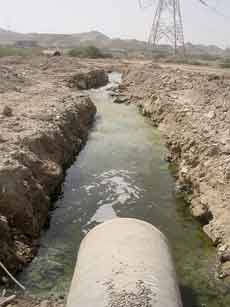JEDDAH: Residents in the Al-Ajwad and Al-Tawfiq districts in Jeddah have slammed the local municipality, claiming water being drained from the Musk Lake is seeping into their neighborhoods.
They have called on the committee investigating the November flooding disaster to visit the affected areas, which they say is turning into a dangerous breeding ground for mosquitoes.
The residents added that a new sewage lake has effectively formed in the districts that has submerged homes and created a bad smell, forcing them to contemplate leaving the neighborhood.
They added that the carelessness of the municipality in draining sewage water from the Musk Lake is not only threatening their lives but also increasing the level of underground and surface water.
Al-Ajwad resident Muhammad Al-Maqati said the municipality had dumped debris in the Al-Hifna Valley, which used to be a passageway for sewage water.
The authority had been constructing pipes to transport water from the Musk Lake directly to the sea. However, the pipes started leaking.
“Instead of being safe from the water of the Musk Lake, we now have a new sewage pool that we call the Al-Ajwad or Al-Hifnah Lake,” he said, adding that the pipes, which are supposed to pump the Musk Lake’s water, remained clean.
Fellow resident Abdul Aziz Al-Lahhawi warned that a disaster of underground water flooding Al-Samir and other eastern districts could happen if water from the precautionary dam was to pour into the Al-Samir dam and the valley passageway.
“The water is now coming from under the embankments and the houses. Our entire district is now floating on water, which is surrounding our homes, schools, mosques and other buildings,” he said.
His brother Faisal said the area now has a new breed of mosquitoes, which is black in color, bigger in size and immune against pesticides.
“I spent more than SR1,000 on insecticides but to no avail. The mosquitoes have now become the real landlords and we are the intruders,” he said.
He added that he is considering selling his house and moving to another area.
Al-Tawfiq resident Abdullah Muqbil said he had lived in the district for more than 15 years but had never seen the municipality providing any services to pump out filthy underground water or drain rainwater.
Local resident Bassam bin Jameel Akhdar, who is also an elected member of the municipal council, said the project to pump out water near the precautionary dam would greatly increase the level of the underground water in all eastern districts. He said this water would go toward the Bani Malik Wadi (valley) that has building materials and debris dumped there, reaching 25 meters high.
“The collection of water in the valley will increase the level of the surface and underground water in the eastern districts,” he warned.
Akhdar called on the municipality to stop pumping water through the valley and to use high-quality pipelines that could not be damaged easily.
“The collection of sewage water in the residential districts could result in natural disasters in the not so distant future,” he warned.
The municipality on Monday began pumping water from the precautionary dam into the Al-Samir dam. From there the water will travel through a concrete canal into the sea.
It is estimated that all water in the precautionary dam will dry up within two months. Mayor Adil Fakieh inspected the project on Monday.
The municipality contracted a local firm to construct the Al-Samir dam, which will be 160 meters long and seven meters high. It will also have 10 large pumps to pump water into the canal.


